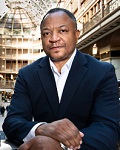2020
Craig Lanier Allen

Dissertation Abstract
"Spies Spying on Spies Spying: The Gibson Affair, the Café Tournon, and the Specter of Surveillance in Postwar American Literary Expatriate Paris, 1953-1958"
Spies Spying on Spies Spying: The Café Tournon, the Gibson Affair and the Specter of Surveillance in Postwar American Literary Expatriate Paris, 1953-1958
The history of American expatriation in Paris offers a rich archive through which to explore historical tensions between notions of freedom and citizenship. What is particularly notable, yet less well known, is what this same history offers regarding concerns for national security and domestic intelligence-gathering practices in free, democratic societies. My dissertation will explore how American government practices shaped the experiences and literary production of American writers living in postwar and early Cold War (1947 to 1960) Paris. I examine the role of surveillance and intelligence-gathering in postwar literary expatriate Paris – a topic which, save for a few references in the biographies of writers from the period, has received little scholarly attention. The very assertion that surveillance and clandestine government action played a defining role in the lives of expatriated American writers challenges historical notions of Paris a liberatory place. This not only compels us to reconsider the literature produced by American (and French) American writers in postwar Paris and their environment, but also to think more broadly about state power, surveillance across national boundaries, and the limited possibilities of expatriate life. In so doing, I document and uncover the connections between the American intelligence community and the two main circles of American writers in postwar Paris, namely the imagined community of exiled African American writers known collectively as Paris’s Rive Noire (Black Bank), (Richard Wright, James Baldwin, Chester Himes, Ollie Harrington, William Gardner Smith, and Richard Gibson) and the founders of the Paris Review literary magazine (Harold L. Humes, Peter Matthiessen, and George Plimpton). The point of departure for my exploration of the myth and reality of American government surveillance among these circles is the notorious Gibson Affair of 1958 and the epicenter of it all, the Café Tournon.
Spies Spying on Spies Spying: The Café Tournon, the Gibson Affair and the Specter of Surveillance in Postwar American Literary Expatriate Paris, 1953-1958
The history of American expatriation in Paris offers a rich archive through which to explore historical tensions between notions of freedom and citizenship. What is particularly notable, yet less well known, is what this same history offers regarding concerns for national security and domestic intelligence-gathering practices in free, democratic societies. My dissertation will explore how American government practices shaped the experiences and literary production of American writers living in postwar and early Cold War (1947 to 1960) Paris. I examine the role of surveillance and intelligence-gathering in postwar literary expatriate Paris – a topic which, save for a few references in the biographies of writers from the period, has received little scholarly attention. The very assertion that surveillance and clandestine government action played a defining role in the lives of expatriated American writers challenges historical notions of Paris a liberatory place. This not only compels us to reconsider the literature produced by American (and French) American writers in postwar Paris and their environment, but also to think more broadly about state power, surveillance across national boundaries, and the limited possibilities of expatriate life. In so doing, I document and uncover the connections between the American intelligence community and the two main circles of American writers in postwar Paris, namely the imagined community of exiled African American writers known collectively as Paris’s Rive Noire (Black Bank), (Richard Wright, James Baldwin, Chester Himes, Ollie Harrington, William Gardner Smith, and Richard Gibson) and the founders of the Paris Review literary magazine (Harold L. Humes, Peter Matthiessen, and George Plimpton). The point of departure for my exploration of the myth and reality of American government surveillance among these circles is the notorious Gibson Affair of 1958 and the epicenter of it all, the Café Tournon.

